What the World Needs Now
By Alison Bennie for Bowdoin MagazineAs higher education faces a limited but loud group of detractors who question everything from college and university values to career and financial outcomes, as uncertainty dominates politics and culture and technology, Bowdoin does what it always has: graduate classes of students who go on to create good in the world and build success for themselves.
We asked a group of employers in the Bowdoin community who think about what it takes to be successful in the workplace what they look for now, what qualities we need most in young workers, and what students can do to best prepare for their careers.
What do they say? Embrace the unsteadiness. Change is the constant, and evolution is essential—be curious, collaborative, creative.
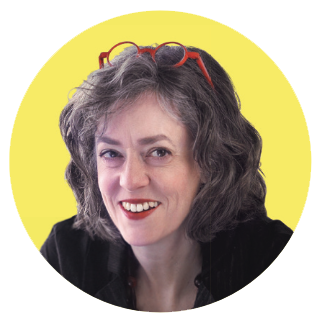
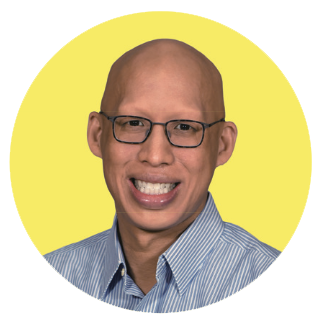 Chris Louie P’27 worked for McKinsey & Company, Nielsen, and LinkedIn before becoming the head of talent development for Thomson Reuters.
Chris Louie P’27 worked for McKinsey & Company, Nielsen, and LinkedIn before becoming the head of talent development for Thomson Reuters.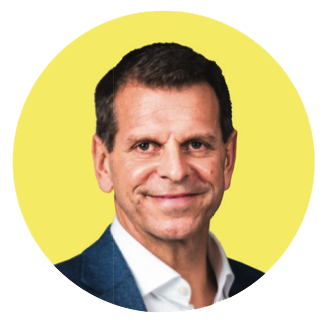 Mike Simonds ’96 worked for Unum and McKinsey & Company before becoming the president and CEO of TriNet, a payroll, benefits, and HR compliance firm.
Mike Simonds ’96 worked for Unum and McKinsey & Company before becoming the president and CEO of TriNet, a payroll, benefits, and HR compliance firm.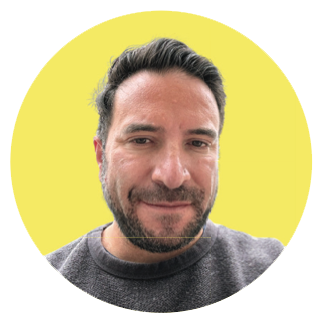
BOWDOIN: One of the questions we get is what is the value of the type of education we offer for students, in the workplace? Parents ask this question a lot. Employers ask this question a lot, and students, particularly when they’re trying to figure out what to major in, wonder how that’s going to translate into marketable skills and experience—like how are they going to get a job?
You’ve thought a lot about what it takes to be successful in the workplace, what you look for in employees—can you help connect the dots. What do you think the current world, with both its problems and where it is poised for success, most needs from young people?
INMAN: I think, particularly now, it is the ability to sit with discomfort and to experience discomfort. I know people like to talk about a growth mindset, but I feel like that’s become too buzzwordy to even mean anything. There’s a wonderful author that I love named Kelly Corrigan. She wrote a book called Lift, and it evoked the metaphor that it’s really turbulence that allows us to get to a higher level. From my fifty-five-year-old eyes, I think I could have benefited from understanding that it’s actually “live and enjoy the discomfort and know that from the discomfort will come change.” Change is good, but we don’t get change—we don’t grow—unless we experience the turbulence.
And I think the flip side is also true, which is you just have to know that we are always constantly evolving. I know that when you’re a younger worker in particular, you look at your elders, people in the workforce, and you think we know all the answers or that we don’t experience these sorts of things. And that’s one of the most important skills, to know that you’re not going to arrive—it’s a constant journey. The more you know that and lean into it, you realize that actually that’s part of the fun, the constant evolution.
I actually just launched a brand new law firm three weeks ago, and, while a couple of my friends are retiring at this exact same time, I just think that’s what you need.
BOWDOIN: Anybody have a response to the idea that the ability to sit with discomfort is really important?
WALLACK: I would totally agree. When I graduated in ’98, I think the stat was something like you’re going to have seven careers over the course of your lifetime. Based on what I’ve been seeing and what I anticipate, particularly with AI and particularly with it being fashionable for companies to lay people off when it helps to increase the stock price, I think that rate—I haven’t seen stats on it, but I would guess it would at least double. So people are going to be on sort of unsteady ground for a lot of their professional lives.
So I think being comfortable, as Mary says, with that feeling of discomfort is going to be one. And I think another thing that will be helpful is if people maintain their curiosity about what is changing in the world, that they learn about those things that are changing, they give them a try, and they immerse themselves. And the ability to then adapt to those changes when things get tough, that is going to be, I think, the signature of people who are able to stay relevant and engaged in their work environment.
Another aspect, which Mary also touched on—and I’ve experienced this too—is that people are going to have to cut themselves some slack and have some grace. The thing that I found going from an academic environment into a work environment is that you can’t expect to always have the same success as you go from place to place. There are going to be moments when you’re able to apply the knowledge that you gained and you’ll be able to be very successful. There are moments when you’re going to be in a new environment, a new kind of organization, a new kind of business, doing a new kind of role, when you’re going to take a lot of knocks. And if people can cut themselves some slack and acknowledge that they’re in a growth mode and continue to be curious and adaptable and not expect to move as fast with the same success, I think over the long term they’re going to be happier and more fulfilled.

LOUIE: Can I add on to what Tim just shared, specifically the curiosity piece? Because when I thought about your question, Alison, with everything going on in the world, what’s the hope or what would be the great thing that young folks can bring—I think one answer is “curiosity.” And maybe a greater inclination to ask why of the people who are further along in their careers. “Why is that?” Part of it is this idea of natural curiosity, and this is where that kind of liberal arts mindset and background really can come into play. Because it can lead you to not only ask why but also to want to actually chase things down from a number of different angles.
That inclination to ask why can also come from being less encumbered than folks who may already be a little bit further down the line in their careers, who feel like they’ve built certain things and don’t want to put those things at risk, whether it’s reputation or relationships or an existing business—something that you don’t want to risk. They’re much closer to being free to ask why and even maybe more free to challenge. I think that’s something that we need. We need to figure out ways to build on, as opposed to attacking, what others are doing and seeing. Starting with being courageous enough or free enough or in the right position to ask why is pretty essential, especially as things change and as we’re seeing things in the world that we might not have seen before, or might not remember. Because history forgets sometimes.
INMAN: I totally agree, and there’s some nice empirical data that supports exactly what Chris is saying. I get to speak to a fair number of business school students, and they all want to know about Elizabeth Holmes or whatever the fraud du jour is, and they ask similar questions. And I always say to them, “Believe it or not, the data says that, because you enter an environment with fresh eyes, you think ‘I’m junior. I’m the least experienced. I’m not going to be a contributor,’ and in fact you have a superpower. And it’s that you come in with fresh eyes.” So I always say to them, “You often will be the person most junior and in the disparity of power probably the least likely to speak up. In fact, it’s honestly most important that you be the one to speak up, because you have a perspective that other people don’t.”
LOUIE: Yeah, you’re clutching to first principles sometimes. You have all this other stuff layered on by whatever things you think you have to become an expert in.
SIMONDS: I definitely agree. Maybe the other point I would note is the world’s becoming more complex, and so how do you make decisions? It ends up being much more effective to do through network versus more traditional structures, which tend to be more “command and control.” And so, coming in with an orientation toward quickly building and establishing trust and an openness to listen to understand versus to respond, the ability to think critically about what you hear and of your own points of view—in general, trust. How do you establish and build trust? For organizations that rely on mechanisms that are more static, it works fine when you know the patterns that you’ve seen previously are good guides for what you’re encountering today. I just think that happens less and less frequently in today’s more complex world.

BOWDOIN: Given the kinds of things that you’ve talked about, sitting with discomfort, the courage and inclination to ask why and to question things and to develop trust, is there a type of background or experience that you can connect to young people developing those skills and that type of inclination? Do you see it coming from someone who has a certain educational background or work background?
INMAN: Alison, in that question I hear all the nervous parents in the admissions, like, “Which one should they go into? What’s the hot one these days?” And I’m going to say the expected thing, which is the background that you should go into is the one that you’re passionate about. You should not be dictated by what’s the trendy thing. I’m the perfect example. It was very trendy in 1990 to speak Russian, because we thought glasnost was happening and the world was opening. And I loved Dostoyevsky, and I loved reading Eugene Onegin in the original, so I went into it for passion. But that was the trendy thing to do—and then, of course, the doors shut forever more.
I think that is one of the biggest things. Any background you care about is the background that is going to be the recipe to success, because you want a calling. You don’t want a job. And you develop that calling. You’re not going to immediately know it out of Bowdoin, but by starting at Bowdoin and saying, “These are the things that really get my juices flowing and this is what excites me”—I didn’t know I was going to be a whistleblower lawyer and I was going to make my career helping other people speak truth to power. I had no clue. But I was into theater, and that’s a form of speaking up. The path is going to be a circuitous one.
To your question of “Is there a background?” No. Every background is the background that will get you there. I guess what I would add is any background that can give you experiential learning is important. That’s why I really love students who’ve studied abroad, because they’ve had to put themselves out there. You have to be curious to have studied abroad. People who are risk-averse are going to say it’s safer to stay in the known. So, I guess I can actually connect it in terms of backgrounds. I would say a background where you’re in a field that lets you really put yourself out there.
WALLACK: I would agree a million percent with what Mary just said. I remember when I was picking my major—I studied art history and religious studies—I remember my parents kind of freaking out and saying, “Of the two things you could pick, you just combined the two that are probably the least likely to ever get you a job.” But I got a job almost immediately after school, in product design. The hiring manager asked me, “So, art history and product design, what do they have in common?” And I said, “Well, in art history you look at an object and then you understand the cultural context around it. In a product design, you understand the cultural context and you recommend an artifact for it that’s culturally relevant.” He was like, “Boom, that’s it.”
I ended up studying the things I was most interested in. Of course, I kind of followed my heart and my interests and what lit me up. And I think there’s an important inflection point, when you realize a career you want to pursue and you make those kind of interesting, unexpected lateral connections between what you studied and what that organization or industry is about. At least in my case, it impressed a hiring manager. When I’ve been a hiring manager, it impresses me when somebody has sort of an unlikely background and they can kind of connect it to what you’re doing. I always find that to be a really pleasant surprise.
LOUIE: I agree with this, but then I’d like to go deeper. Speaking from a recruiting perspective, what we’re looking for—and I think what we will increasingly be looking for, given the impact we expect from AI, where requirements to study this or get a degree in that are being shaken up because AI can actually address a lot of those entrenched skill sets. You’re left with truly transferable skills and abilities. And those transferable skills and abilities are things like creativity, or the ability to ideate, or the ability to take ideas and figure out how best to execute them. And those things could best come out, as Mary was saying, in things that you’re passionate about. Because passion will lead you to create. Passions will lead you to be entrepreneurial, they’ll lead you to do stuff that actually makes a mark, as opposed to just going through the motions, sitting through the class, showing up to work, and checking the box.
So, we’re going to be looking for “What have you done? What have you accomplished? What have you produced?” as opposed to “What are the bullets on your résumé or on your LinkedIn profile?” The more that people can lean into those things that they find passion in and find those that compel them to go further and actually achieve creation and impact, I think the better off they will be.
SIMONDS: I would just go back to track with all that: Mary and Tim, what you were saying around getting comfortable with discomfort, putting yourself in situations that are not familiar and where the results are uncertain, and your point about curiosity. It’s like, “Show me the stretch.” I’m actually a little less concerned with the specific knowledge you’ve accumulated through your course of study. Increasingly, that kind of knowledge is at your fingertips anyway, to the point that, Chris, you’re making. But are you putting stretch? Are you taking risks? Are you seeking to outperform the norm and maybe what you think is easy, comfortable, achievable, safe?
I love seeing very quantitative courses in the middle of a very non-quantitative course of study. I love to see people who take on huge community engagement or huge athletic endeavors or things that are going to put real pressure on them—and, frankly, succeed at some and fail at others. That’s a great candidate.
LOUIE: You hear that stock interview question of “What’s your greatest weakness?” or “When have you failed?” I think, “How have you shown agility in your life, in your career?” Tim, you made the point about AI probably doubling, or maybe even at a greater multiple, the amount of change that we’re seeing in jobs and careers, especially over a lifetime. I think that’s true. I think that’s going to keep increasing.
And so what do you want in terms of talent? You want people who are going to be able to adapt, not in a reactive way, but who can lean into that different thing or that next thing that they could be doing. As opposed to getting shell-shocked by the world changing on them to the point they couldn’t produce, either for themselves or for the team.
WALLACK: I’m hoping those AI models get really savvy, so people don’t get weeded out who don’t have the right buzzwords in their résumé. I hope they kind of start to read between the lines and look for things like agility, because I’m not confident—you would know better where we’re at right now—that people aren’t getting weeded out that haven’t been working in AI models.
LOUIE: Yeah. There’s a book—there are many books now coming out around this—called The Algorithm, by an investigative journalist and NYU professor named Hilke Schellmann, that I’d recommend reading. Because it’s all about this. It’s all about the downside of trying to apply AI to different talent processes, including the hiring process.
BOWDOIN: Are you seeing that a lot? Is that something that is happening in many places—instead of screening by a human being, screening of résumés and applications is being trusted to AI?
LOUIE: It’s been out there actually for quite a while. I think you’ve seen it historically in high-volume hiring situations where there’s a lot of turnover: frontline workers, retail workers. There are some large retailers bringing in thousands of candidates in order to make hundreds of hires. I think the change over the last few years is this practice has spread to all kinds of jobs now. And so one of the big efforts within the talent industry has been to really adopt ethical responsibilities of AI, to find what that means, to ensure that a human is in the loop. But, yes, it is somewhat pervasive.
BOWDOIN: Interesting. So, one of the things we’ve seen at Bowdoin is that employers will talk a lot about appreciating the kinds of skills that students develop at Bowdoin—critical thinking, many of the things you’ve been talking about—but then when they come to recruit, they have an opportunity to list the majors that they’re looking for, and they rarely list humanities majors.
Do you think that is just a failure of imagination? Do you think that is a disconnect between what the leadership at these companies say they want and the maybe more junior person who’s on the ground doing the recruiting? What do you think that’s about? And how do you think that we can reassure someone who thinks “They don’t want to even talk to me? How can it be useful for me to be a humanities major?”
LOUIE: I’m going to let a non-recruiter respond first to that. [Laughs]
SIMONDS: Yeah, I mean, Chris would certainly know best, but I think that’s a very plausible hypothesis, Alison, that there’s just that little bit of a disconnect. In general, not enough thought goes into the requirements part, so you end up putting things in there that honestly you don’t really care about. We know that, depending on your background, how people identify, they’re going to hold themselves to a higher standard, and then in terms of whether they’ll either reach out and apply if they’re not seeing themselves on that list? So, I think it’s pretty problematic. And it’s probably a broken process.
My practical self would say—my encouragement would be—you’ve got to blow past that. You’ve got to go work the problem, and you’ve got to go get that interview. And if it means stalking somebody at Smith Union or wherever, where people get coffee, and getting time with them. That initiative to get after it I just think is really important and ultimately what they’re looking for anyway.
WALLACK: I would totally agree. And it would echo my experience majoring in what I majored in. I certainly got some management consulting interviews. The only reason I had those was because I had some internships in management consulting when I was at Bowdoin. And the only reason I had that was because—this totally dates me—I went through the Yellow Pages when I was living in Boston and just started calling every management consulting firm, seeing if they would take on an intern for the summer. That’s how I ended up getting my foot in the door.
When I moved to Portland, Oregon, after school and I didn’t have a job, I went to every tall building I could find and looked up what the buildings were and just asked to have a coffee conversation. And that’s what got me in product design. So, I think, relative to somebody who’s studying computer science at MIT, yeah, it might be tougher. The reality of many companies is they want somebody who can get up to speed as quickly as possible and is not going to have as steep of a learning curve.
But the reality is that most skills are reasonably easy to pick up if you’re curious and motivated. I think companies just take the path of least resistance. So, oftentimes you have to put a little more effort in at the beginning. But having a belief that you’re capable and sharp and curious and interested in doing great work, if you maintain that belief, you’ll find something really great.
INMAN: Before we turn it over to the professional, I would say that it does show a lack of imagination on the part of the recruiters, if that’s where they are, because the jobs that they’re recruiting for, many of them don’t exist. And so, maybe your requirements work for right now, but like we’ve all said, in a heartbeat that could change. I think you really have to be thinking about who are the people who will be adaptable? That’s the most important piece.
LOUIE: On behalf of the profession [laughter]... I agree with all your comments. The perspective I would add is that what you’re seeing is a combination of legacy and numbers. From a legacy standpoint, history, what was on the job requisition previously? Requirements that help cut through large numbers of applicants to get to “great talent,” like a specific business undergraduate program or a set of very technical and specialized programs, which can be very restrictive, I agree with what Mary and several of you said earlier: If you’re doing it that way, you probably are recruiting to what you need right now, rather than finding talent that could be really great for the job in the future or the one that might not even exist yet.
But, again, it’s human nature to fall back into legacy and try to manage the numbers. What does that mean for a liberal arts student, a Bowdoin student? I would emphasize what Mike and Tim said—understand that that’s the reality of the game today whether you like it or not. How do you play that game effectively? Well, again, as the recruiter or as a hiring manager, “show me.”
So, if the course isn’t available at Bowdoin, guess what? CXD provides a lot of opportunities for supplementing with business courses and more technical courses—my daughter just got an email highlighting some options this morning. You can also go out on your own and find those things, whether it’s in the form of an internship or even a community college class you might take over the summer. If you can demonstrate that you’ve gone the extra step to gain some of those skills and capabilities and experiences that the employer might have been looking for, that can bolster your story.
And then making human connections to get the chance to tell your story and not get lost in the numbers. That’s my advice to my own daughter, so that would be my advice to the broader set of students as well.
BOWDOIN: We’ve been talking about it from the student’s perspective, like what should they do and how should they prepare themselves. Thinking about it from the employer’s point of view and also the needs of the world, how would you characterize what you see missing in that pool of talent?
People like to bemoan how terrible young people are. Are you optimistic? Are you pessimistic? What would you say is the current gap between how people are prepared and how you think they should be prepared or what you think the world needs?
WALLACK: I think the biggest gap I’ve seen and that I definitely experienced is working as part of a team. I think when I was in school I had the belief that you look at the world, you see how broken it is, and you’re like, “Oh, they should just”—whoever “they” are—“they should just do this, and everything would be better.”
And then, when you get into the world, you realize that even good ideas don’t mean a whole lot; it’s how do you help others take hold of and own those ideas and collaborate on them and build them and get momentum behind them. That was something I felt wholly unprepared for. I don’t think it was even really on my radar. It was like, “Hey, I study hard, I’m smart, I’ve got good ideas, and I want somebody to listen to them.” But having others actually take hold of them and then build upon them and add an expertise that I don’t have to those ideas, I think that that was the biggest missing piece. And I’ve also seen as new people enter the workforce, it’s more about “me, me, me” and less about “we, we, we” and “What are we able to actually achieve together?”
INMAN: Can I jump on that to say, “Yes, yes, and yes”? There’s actually a great book, since we’re talking about books—David Brooks wrote a book recently called How to Know a Person: The Art of Seeing Others Deeply and Being Deeply Seen. This whole question about team-building and being part of a team, he breaks it down into saying when you’re in the environment, look for diminishers versus illuminators.
I think there are two things that underscore what Tim is saying. First is that we are coming out of COVID, and there’s a loneliness epidemic in this country that the surgeon general warned about. The last time they did a warning was, like, what, cigarettes? And you add social media onto that; I think we’re all in our own bubbles. So, it’s not just that we’re not in teams, it’s that we don’t know how to work in teams. The gap that I’m seeing is they don’t know how to hear a different perspective. And that isn’t their fault necessarily. We’re all being kept in our own bubbles by the algorithm.
I think it’s Arthur C. Brooks, who teaches about happiness at Harvard Business School, who cites some research that connects happiness, which I think is also success and contentedness, to getting into contact with people who have a different point of view than yours. I think that’s the gap right now. He gave the example of, “Join a bowling league.” I don’t think bowling leagues exist much anymore, but anything that gets you out of your bubble. We’ve always been in bubbles. We all have our own bubble. And so, maybe your bubble is the bowling league and you need to get somewhere else.
But I think that’s the gap, the sense of difficulty to work with others and difficulty to even comprehend different points of view, because your point of view has been so curated. I mean, we’re seeing how divisive it is out there in the world. Young people are being simmered in that. And so, I guess I would just add that onto what Tim said. It’s the inability to work as a team and not even see the importance of connectedness. I think that’s part of it, a failure to see that we’re all connected.
SIMONDS: I guess I have a slightly different point of view, which is—to your specific question—I’m hugely optimistic. Hugely. I agree with the problems around teaming and the lack of, generally, skills we need around being humble and being open. So I agree with the broad point. But when I think about people entering the workforce right now, I’m so optimistic. I’ve done early career onboarding programs to rotate people through different parts of our organization. And if you ever want to have a great day, start it with those people. The energy—they’re just used to thinking very broadly about things. There’s a boldness to it, some courage.
I think they’ve dealt with a lot of real loss over the last four, five, six years, and uncertainty. There’s this thing about entitlement. I’m not convinced every generation doesn’t think the generation that follows them is entitled. I think the talk track is a repeating theme. I think there’s a resilience to that very challenging stretch of time that we’ve just been through and this whole shared experience that we just have been enduring together that leaves me feeling very good.
And I think there are some of these things where they’re not on an exact or sort of linear path to forever. Some of this is like a pendulum, and it kind of swings back and forth. So, I sort of see things swinging a little bit back more toward an appreciation for each other. I sense a purpose in the work that we do, a little less self-centeredness, and a little more breadth. But that’s just my experience.
LOUIE: Yeah, I’m going to lean on the side of optimism as well, probably for a lot of the same reasons that you just highlighted, Mike. I’ve seen people in general and specifically young people, earlier tenure people, do really amazing things. And I think with the technology in their hands that can allow them to unlock that even more, we’ll see them go even further.
At the same time, in terms of where do we go in the future or which way do we go, Alison, it brings up to me one of the other questions that you asked in the prep: what do we owe or what should we provide to young people? I think it is, number one, listening, providing the opportunity to actually make a mark. Listening to that different voice or that sometimes even divergent voice and taking those views seriously, even if they’re outside the norm.
Providing that support, that role modeling, that scaffolding to ensure that they have the right environment to be able to make mistakes, grow from them, have things pointed out to them, and the chance for connection. Tim, your point around the isolation and the importance of learning how to work with teams, we need to help foster that. I feel like, as a leader within my company, that’s part of my job, to help foster that environment. That’s contributed to some of the stuff we try to talk about in terms of being together in the office. We ask our senior leaders to actually be present more often in the office than we do the broader set of colleagues, because they’re meant to provide those connections, to mentor, provide apprenticeships and opportunities to people. If we create the right environments, I have a lot of hope for where our future will go, driven in many ways by our younger people. If we don’t, there’s a chance that we can squelch or miss that opportunity and squelch some of that enthusiasm and potential.
BOWDOIN: Anybody have any reactions to that? What do you think, if anything, we owe to our youngest employees?
INMAN: I mean, the only issue I would take for Chris, or just interest in knowing is, how do you have apprenticeships, which I think are vital and totally agree, in a remote environment?
It’s just so hard. I know we need to be creative; we need to figure out other ways to do it. I just think it’s one of the harder parts. But I think everything Chris said is what we owe them. We owe them listening, we owe them apprenticeships and opportunities, and not to coddle but to give them direction. I think what we owe them is to role model. We have to come in and show that—if we believe in connection, then we need to model connection. We need to model what we want.
I have a great anecdote about this. We lived in London for three years. My job gave me an excuse to live there, and just the way the demographics were for the international school where my kids were, most of the ex-pat parents who were working were the fathers, and a lot of the mothers were at home. And this is a particular age when my thirteen-year-old was like, “You are not coming in to speak at Parents Speak Day. You’re just not.” And I remember saying to him—this is sort of my modeling anecdote—I said, “You don’t have to come. It’s totally fine. I’m not doing this for you. I’m doing this for the young women in the room who need to see that it’s not just a parade of men who are in these roles, that there’s a woman.” And it was really interesting because by not speaking down to him—he did go, he sat in the way back of the room, but he basically said, “Mom, all the young women said you were the only one that had come and that was so cool. And they think you’re cool.” I was like, “Whoa. I did not expect that to happen.”
I think that’s the thing, the piece of really showing up and connecting and showing your people what can be done and how you want them to do it.
WALLACK: I think that’s an important aspect.
I think maybe another side is inspiration and bringing passion to your work as a leader. I think one of the terms that has had a lot of currency for a while is “the servant leader.” And while I agree that there’s a lot of support and safety and opportunity to fail and provide feedback—those things are super important—but if you’re not also modeling or bringing inspiration to what you’re doing and you’re giving inspiration to an organization and setting vision and bringing things into a new direction...I think it’s always a bad sign when people don’t want to become managers, they don’t want to become leaders, because they’re like, “That job just looks miserable.” And so, I think being a point of inspiration and somebody you do want to model to make others say, “I want to be that” gives young people something to strive and work for their own way.
BOWDOIN: I’d like to end by asking each of you personally: Is there something that you studied that you had no idea was going to really be useful to you? You didn’t choose it because you thought it would prepare you for a career. You didn’t choose it for any reason, but you keep thinking back on it and thinking, “This was incredibly useful.”
SIMONDS: I immediately have an answer. It was a sociology course on gender, and it was a huge unlock for me. It was an unlock in terms of my professional life, and it was an unlock in my personal life too, and I would highly recommend it. I think we should put it in a required curriculum somehow, because it had all kinds of really interesting ethnographic studies of gender and identity. It was just so rich, so deep, and just reframed a lot of things for me that put me on a journey that’s been immensely helpful.
INMAN: I have a really random one. I’ve already alluded to it. What stuck with me, and I didn’t appreciate it at the time, is I had to read Eugene Onegin in the original Russian. And then, I went to study in Russia, and I’ve since had Russian clients. And that ability to—it makes me think about what Tim was saying about cultural artifacts. Eugene Onegin is a beloved book in Russia the way that, I don’t know, Tom Sawyer is for some here. In Russia that is the book. And to know that unlocked to me the power of what gets lost in translation and the power of connecting with a culture. If I say, in Russian, a few lines from that book, Russian people will love me forever and follow me to the ends of the earth. And I feel like that was a gift that I don’t think I understood at the time. It just taught me that every culture has its proudest author and we lose a lot in translation.
WALLACK: So, I think if we’re going with some books that were really inspirational for us, I had two. The first was The Elementary Forms of Religious Life, by Émile Durkheim, and I read it in a theories of religion course. And the thing that was very interesting was that he began with just a provocative question, which is “What is the benefit of religion?” So, I think the idea and the power of a good question is something that’s always settled with me.
And then, one of the things that he had found was that, if you wanted to understand a society, you should look at the artifacts that it’s created. So, he studied the aboriginals, and he’s like, “You can understand this culture by the things they created. Is there a large place to study or to worship?” That’s something that’s important. “Do they have a jail?” So, if they have a jail, keeping misbehaving people from non-misbehaving people is important. I think that critical look at artifacts and investments has helped me think about products and, like, a physical or a digital product. What does the product most optimize for, and is that what the user most values? This idea also applies to organizations—if we say we’re the most customer-centric organization, it should follow that we have an empowered customer insight organization, that delighting customers is central to how workers are pro- moted and incentivized. So, it’s helped me to think critically about those things.
The other book was called Seeing with a Native Eye, by Walter Capps. He’s an anthropologist who wants to study Native American culture, and he realizes that he can’t go there with his own language and perception to describe what’s going on. He needs to understand what’s happening in that local culture and explain things in the language that they understand and use.
And I think the ability to actually see through others’ eyes and experiences is one of the most important things to have. I think the inability to do that is what’s keeping us divided.
LOUIE: All right. I will round us out as the non-Bowdoin, non-liberal arts person on the panel. I actually got three business degrees, including undergrad. But to answer your question, the course that I’ll talk about wasn’t actually a business course. It was the one programming course that I took in undergrad. And when I say programming, I use the term loosely—I was telling somebody who actually has real programming background and knowledge about learning Visual Basic for Applications, and they began sort of laughing at me. Because it’s kind of primitive and kindergarten level.
But the reason it’s had an impact on me is because I learned to learn about technical things. It demystified programming for me, which has been really useful over the course of my career. And so, I think it’s in that spirit of liberal arts and kind of like the learner’s mindset that I share it. Being able to absorb yourself in something different and embrace that passion you were talking about, Mary, and kind of go wherever your heart and mind takes you is a really, really great path.
Alison Bennie is editor of Bowdoin Magazine.
Brian Stauffer is an artist and illustrator whose work has appeared in The New York Times, The New Yorker, and more than three hundred other publications worldwide. See more of his work at brianstauffer.com.
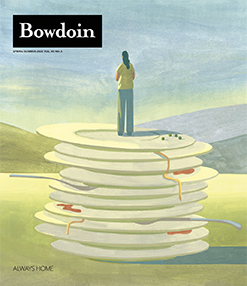
This story first appeared in the Summer 2024 issue of Bowdoin Magazine. Manage your subscription and see other stories from the magazine on the Bowdoin Magazine website.